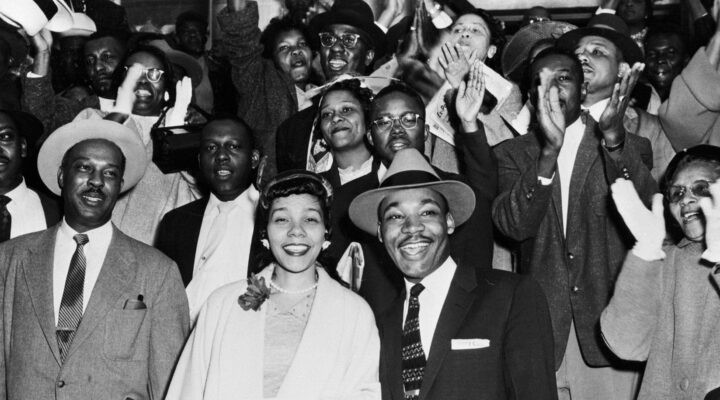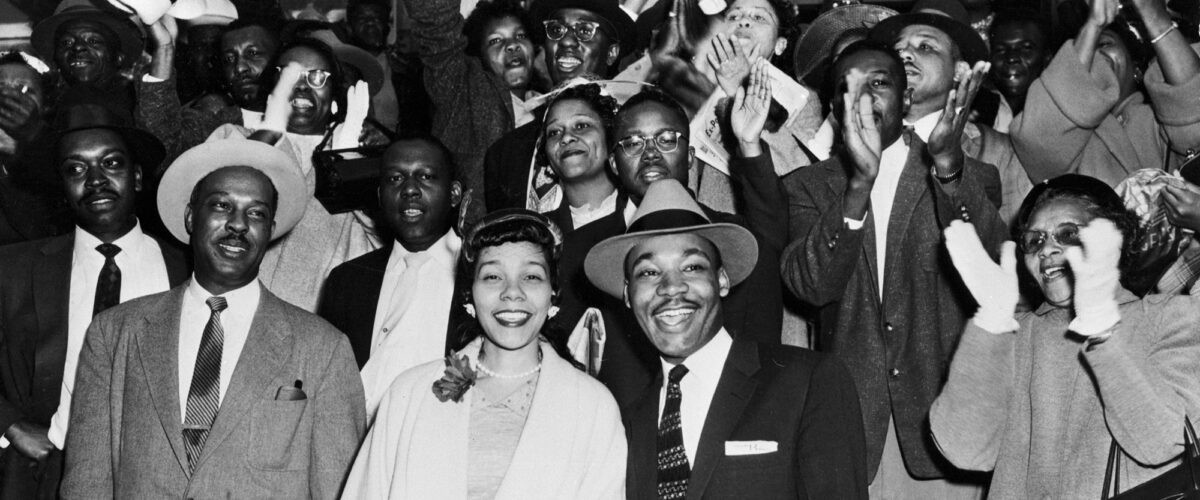As we remember this month the legacy of Martin Luther King Jr., we would do well to understand that King and his philosophy of direct, nonviolent action — initially shaped throughout the Montgomery Bus Boycott of 1955-1956 — arose from his Baptist values affirming freedom of conscience and Bible-based dissent against injustice.
In exploring King’s approach to justice work, we will find that he continues to be an exemplary model for present and future Baptist leaders who seek to organize and bring about just societal transformation while giving voice to their own Bible and conscience-based, dissenting perspectives.
Throughout their history, Baptists have placed a high value on freedom of conscience, soul liberty, and the centrality of the Bible in their faith practices. This has led them to be a people of Bible-based dissent from their very beginnings.
Born in dissent
Appearing around 1608-1609, the first Baptist groups in Holland were comprised of exiled English dissenters who had been persecuted by the Stuart monarchy.[1] These early groups “emphasize(d) the role of the individual conscience in many of their confessions of faith … (showing a) concern for conscience (as) a hallmark of Baptist identity.”[2]
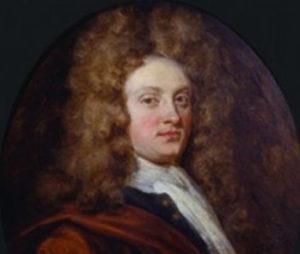
Thomas Helwys
The Baptist movement’s early leaders, John Smyth and Thomas Helwys, saw their church as a “true church … composed of believers only … who could testify to an experience of divine grace and own the covenant with God and their fellow Christians.”[3] This focus on a “believer’s church” shows the importance early Baptists gave to the individual’s conscience and soul liberty. Their 1611 “Amsterdam Confession” states that:
That the church off CHRIST is a compainy off faithful people I Cor. 1.2. Eph. 1.1. separated fro the world by the word & Spirit off GOD… (and) That as one congregation hath CHRIST, so hath all. And that the Word of GOD cometh not out from any one, neither to any one congregation in particular, but unto every particular Church, as it doth unto all the world.[4]
Early Baptists believed they were separated from the world by their conscientious, active belief in God, and they held that individuals and congregations alike had the right to define what exactly this meant for themselves.
In our current times, Baptists continue to place high importance upon soul liberty and the conscience of the individual, and this often shows itself in the form of dissent to public policy. Baptist historian Bill Leonard notes that “Baptists often seem the quintessential American dissenters, challenging the moral, ecclesiastical and political status quo, making their opinions known in pulpits, sit-ins and on Larry King Live.”[5] This is because soul liberty places upon Baptists “a historic obligation to exercise ‘the responsibility of a minority’… speaking out from the depth of Christ-arrested consciences to ‘hatred, discrimination and violence’ of our global communities.”[6]
And in his book Frustrated Fellowship: The Black Baptist Quest for Social Power, James Melvin Washington states that in particular, “Black Baptists have given the United States and the Christian community some of their greatest loyal dissenters.”[7]
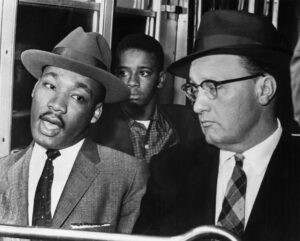
Martin Luther King, leader of the Montgomery Bus Boycott, is shown riding a Montgomery Bus up front with pastor Glenn Smiley of Texas. (Photo by Bettmann Archive/Getty Images)
Martin Luther King Jr (1929-1968) remains one of the most revered and celebrated of these loyal dissenters. Coming to national prominence during the Montgomery Bus Boycott of 1955-1956, King proved to be an incredibly powerful voice of dissent for people of color across the nation.
Taking a position informed by another widely influential Baptist, Walter Rauschenbusch, King noted, “It has been my conviction ever since reading Rauschenbusch that any religion which professes to be concerned about the souls of men and is not concerned about the social and economic conditions that scar the soul is a spiritually moribund religion.”[8]
A religious and social visionary, King called for the church’s transformation “into a true ‘fellowship’ exemplifying unity, racial integration, a better distribution of wealth.”[9]
Nonviolent protest as an expression of freedom of conscience
King was born and grew up in Atlanta, coming “from a long line of Georgia Baptist preachers from whom he learned about central biblical themes of freedom, justice and hope.”[10] From a young age, he was well aware of the marginalization and oppression of his Black community under the Jim Crow laws of the American South.
King grew up profoundly aware of the many injustices in American society, and he recalls having resented segregation throughout his life and having questioned his parents about it as a child.[11] He “learned to abhor segregation, considering it both rationally inexplicable and morally unjustifiable.”[12]
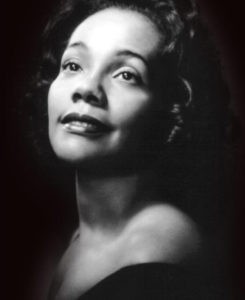
Coretta Scott King
This experiential foundation for King’s civil rights activism was further supported by the Baptist church, which provided many leaders before him who helped set the stage for his success in the Civil Rights movement.[13] Upon completing his doctoral studies at Boston University, King and his wife, Coretta Scott King, agreed that they felt somewhat of an obligation to return to their native Southern United States, where they felt they could be of greatest service, even “in spite of disadvantages and inevitable sacrifices.”[14]
Montgomery as a birthplace of a movement
In 1954, King became pastor at Dexter Avenue Baptist Church in Montgomery, Ala. Racial tensions were extremely high, as King explains, “the Negroes of the South had learned to fear and mistrust the white man’s justice.” [15] The dehumanizing Jim Crow laws of the American South had allowed an oppressive system to lawfully continue throughout the 20th century, and the Black community was tiring of the gradualist approach to racial equality.
In Montgomery, the predominantly white drivers of the city bus system had long been able to act with impunity regarding their treatment of Black passengers, and on Dec. 1, 1955, Rosa Parks was arrested after refusing to give up her seat to a white man on a city bus. Following this incident, a group of Black ministers formed the Montgomery Improvement Association in an attempt to use the Parks incident as a sample case for challenging the Jim Crow system.[16]
Led by King as their president, the MIA would lead the Montgomery Bus Boycott, which would turn King into a national figure, challenge gradualism, and energize large parts of the Southern Black community in a push for civil rights.[17]
The Montgomery Bus Boycott would show Martin Luther King Jr. to be a model Baptist dissenter — one who would use his interpretation of Christian love to advocate for the use of direct action in nonviolent protest. King was by no means the first Black leader to suggest and utilize nonviolent protest, but he would become a leading voice for nonviolent protest through his work in Montgomery and beyond.
Shaped by other dissenters
In addition to having been deeply influenced by his formation in the Black Baptist church, King also was shaped by his study of noted dissenters from other traditions. During his time as a student at Morehouse College, King had become deeply interested in Henry David Thoreau’s essay “Civil Disobedience.” It was his first encounter with the concept of nonviolent resistance, and King said the essay led him to be “fascinated by the idea of refusing to cooperate with an evil system.”[18]
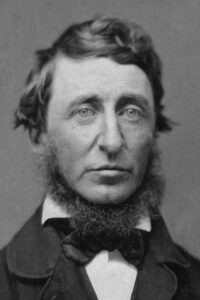
Henry David Thoreau (Wikimedia)
In his essay “Performing Conscience: Thoreau Political Action, and the Plea for John Brown,” Jack Turner suggests that Thoreau’s works “prepare readers to heed their own consciences, to see and comport themselves as self-governing individuals, and to defend their own rights as well as the rights of others.”[19] This bolstering in confidence of the individual conscience was clearly a major effect of Thoreau’s work on King. He also became deeply influenced by Mahatma Gandhi’s nonviolent protest campaigns, noting, “it was in th(e) Gandhian emphasis on love and nonviolence that I discovered the method for social reform that I had been seeking.”[20]
King’s study of Thoreau and Gandhi’s methods seemed to give him an even stronger conviction in the use of nonviolent protest as an effective act of individual and communal conscientious dissent. As King put it, “Christ furnished the spirit and motivation (for the movement in Montgomery), while Gandhi furnished the method.”[21]
‘We are tired’
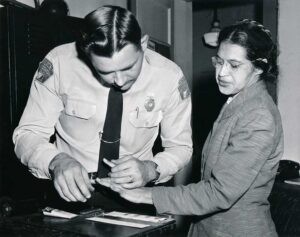
Rosa Parks being fingerprinted by Deputy Sheriff D.H. Lackey, Montgomery, Ala., Feb. 22, 1956. (Public domain image)
The day after Rosa Parks’ arrest, the group of ministers who eventually would become the MIA began planning their response. It was decided that a boycott of Montgomery’s buses by the Black community would be the most effective course of action. Pamphlets were distributed throughout the city urging Black residents to boycott buses beginning Monday, Dec. 5, and to attend a mass meeting that evening at Holt Street Baptist Church.
On the day of the 5th, King was inspired to observe that the participation rate in the boycott was almost 100%, noting: “A miracle had taken place. The once dormant and quiescent Negro community was now fully awake.”[22]
That evening, he spoke to a large crowd at the mass meeting about what had happened to Parks. He explained: “We are tired — tired of being segregated and humiliated; tired of being kicked about by the brutal feet of oppression. … We had no alternative but to protest. … We are protesting for the birth of justice in the community.”[23]
He encouraged the people to “let your conscience be your guide … our actions must be guided by the deepest principles of our Christian faith.”[24]
Freedom of conscience as dissent
At the core of his teaching of nonviolent protest, King was highlighting the Baptist principle of freedom of conscience as the way toward developing and maintaining a powerful voice of dissent. In fact, for King, this power of the freedom of the individual conscience was divinely sanctioned. He describes becoming restless one particular night in January 1956, after he had begun regularly receiving threats because of his leadership in the bus boycott. Speaking to God in prayer, King was almost ready to give up, but:
“Stand up for righteousness, stand up for truth; and God will be at your side forever.”
At that moment I experienced the presence of the Divine as I had never experienced Him before. It seemed as though I could hear the quiet assurance of an inner voice saying: ‘Stand up for righteousness, stand up for truth; and God will be at your side forever.’[25]
In his book For the Healing of the Nations: Baptist Peacemaker Paul R. Dekar suggests that “for King, it was not enough to think about God. God must be encountered in the world.”[26] This was achieved through following the conscience in nonviolent dissent against unjust, discriminatory laws and practices.
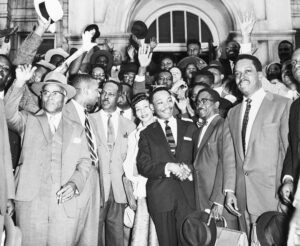
Martin Luther King Jr. shakes hands with his lawyer as they stand in front of a group of cheering followers after King’s conviction for his part in the bus boycott in Montgomery, Ala. (Getty Images)
King led the call for nonviolent protest not only in word but also in deed. On March 22, 1956, he was convicted of having violated Alabama’s state anti-boycott law. He later noted:
I was proud of my crime. It was the crime of joining my people in a nonviolent protest against injustice. … It was above all the crime of seeking to convince my people that noncooperation with evil is just as much a moral duty as is cooperation with good.[27]
Serving as a model of persistence in nonviolent protest, King led with an assured, faithful hope in justice, urging his community to “keep moving with the faith that what we are doing is right, and with the even greater faith that God is with us in the struggle.”[28]
King was careful to point out that this struggle was against injustice itself, not against other people, saying, “The tension is, at bottom, between justice and injustice, between the forces of light and the forces of darkness. And if there is a victory, it will be … a victory for justice and the forces of light.”[29]
An incredibly important point regarding King’s understanding is that he viewed the conscience to be the central influencing factor on both sides of the struggle, as he argued, “The oppressed must never allow the conscience of the oppressor to slumber. … To accept injustice or segregation passively is to say to the oppressor that his actions are morally right. It is a way of allowing his conscience to fall asleep.”[30]
The dissenting, direct action of nonviolent protest resulted in the boycott’s eventual success, as Alabama’s city bus laws were declared unconstitutional in June 1956 and this was later upheld in a November U.S. Supreme Court decision.
A biblical call for nonviolent resistance
As much as King’s approach to nonviolent protest was influenced by his lived experience and his studies, it was, at its core, a Bible-centered approach. Leonard notes that from early on in Baptist history, “Baptist biblicism made a commitment to the authority of Scripture normative for faith and practice.”[31]
As much as King’s approach to nonviolent protest was influenced by his lived experience and his studies, it was, at its core, a Bible-centered approach.
King clearly held to this commitment, as the language he used in his fight against segregation reflected important Exodus and deliverance themes of the Black religious tradition. King spoke out in dissent against “Southern segregationist ‘pharaohs’ who employed legal maneuvers, economic reprisals, and physical violence as a means of keeping blacks in the ‘Egypt of segregation,’” and he frequently made reference to the “‘promised land’ of freedom and justice.”[32]
His commitment to nonviolence was grounded in his view of Christian love, as Andrew M. Manis suggests in his book Southern Civil Religions in Conflict: Civil Rights and the Culture Wars: “The New Testament concept of agape (selfless love) undergirded (his) vision of America. In such a dream, the nation would be characterized by a willingness to let agape direct all individual and societal relationships.”[33]
King described agape as “disinterested love (in which) the individual seeks not his own good, but the good of his neighbor (1 Corinthians 10:24). … (It) makes no distinction between friend and enemy; it is directed toward both.”[34]
Agape as unity
King’s interpretation of agape gave him a strong commitment to unity, as he believed that “agape means a recognition of the fact that all life is interrelated. All humanity is involved in a single process.”[35] This recognition of the interrelatedness of things, King argued, brings about a responsibility to lovingly seek justice for all. He noted, “When I am commanded to love, I am commanded to restore community, to resist injustice, and to meet the needs of my brothers.”[36]
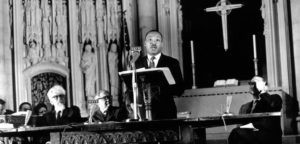
Martin Luther King Jr. at Riverside Church, 1967.
King suggests that from the start of his leadership in the nonviolence movement, beginning in Montgomery, it was driven by this active Christian love. “It was the Sermon on the Mount, rather than a doctrine of passive resistance,” he wrote, “it was Jesus of Nazareth that stirred the Negroes to protest with the creative weapon of love.”[37]
This love, agape, was what commanded King to use “civil disobedience as a public, non-violent and conscientious reaction to unjust law.”[38]
Kirk argues that King’s method of Bible-based, conscientious dissent caused a “transformation in Black self-awareness, self-confidence and self-respect.”[39] After the Montgomery boycott, King would continue to act as a transformative leader in the Black community until his assassination in 1968, as his leadership in nonviolent protest led to the formation of:
the Southern Christian Leadership Conference; the freedom rides (1960-61); mass direct action in Albany, Georgia, and Birmingham, Alabama (1961-1963); the March on Washington and the passage of the Civil Rights Act (1963, 1964); attempts to bring about desegregation of schools and other public facilities in several cities culminating in the Voting Rights Act (1965); active opposition to United States involvement in Vietnam; and the ‘war on slums’ in Chicago, Washington, and Memphis (1965-1968).”[40]
Through all this justice work, King remained committed to the nonviolent philosophy that was based upon his interpretation of Christian love, believing, “The end is redemption and reconciliation. The aftermath of nonviolence is the creation of the beloved community.”[41] As he said at the December 5, 1955, mass meeting in Montgomery at the very start of the boycott, it was protesting with “dignity and Christian love” that would enable the Black community to meet their challenge of “inject(ing) new meaning and dignity into the veins of civilization.”[42]
Conscience, dissent and biblicism today
The Baptist values of freedom of conscience, dissent and biblicism are still extremely influential in shaping Baptist life today. Leonard suggests that the practice of believers’ baptism continues to be a “dissenting act that frees Christian believers to challenge the principalities and powers of church and culture in response to the dictates of conscience,”[43] and he argues that all Baptists are biblicists whose conversionism offers “a powerful option for modifying that biblicism in the face of theological or cultural contradictions.”[44]
The Baptist values of freedom of conscience, dissent and biblicism are still extremely influential in shaping Baptist life today.
At a recent event hosted by Baptist Joint Committee for Religious Liberty, Linda McKinnish Bridges invigorated the crowd by exclaiming, “Dissent is our right, our heritage as Baptists.”[45] Clearly, these values continue to be extremely important to Baptist communities.
Beginning in 1979, divisions and dissent within the Southern Baptist Convention over issues such as biblical inerrancy, female clergy, treatment of LGBTQ individuals and denominational control resulted in new Baptist groups like the Alliance of Baptists and the Cooperative Baptist Fellowship.[46] Both these groups initially formed in response to the perceived SBC conservative takeover, and by the early 2000s, “moderate and conservative Southern Baptists had essentially separated themselves either implicitly or explicitly over women’s ordination and other issues.”[47]
More recently, the CBF continues to experience its own inner strife over its “Illumination Project,” which was released in 2018 and defined CBF’s hiring policies regarding LGBTQ persons in such a way that left both conservatives and liberals unsatisfied.[48]
Freedom of conscience necessarily leads to disagreements and dissent, and the Baptist biblicism that allows for multiple and shifting interpretations means that in some cases, division is inevitable. However, Baptists would do well to continue looking to Martin Luther King Jr. as a model dissenter.
King’s conscience led him to heed the call to be willing to “suffer courageously for righteousness,” as he believed “it is not enough for the church to be active in the realm of ideas; it must move out into the arena of social action.”[49]
His ideal of beloved community, based on his biblical interpretation of agape, led him to be a leader for justice who inspired the communities he was a part of to work toward individual and collective transformation while respecting and loving all involved parties.
Baptists would do well to continue looking to Martin Luther King Jr. as a model dissenter.
The Alliance keeps a “Statements” page in the library on its website, where member congregations and others may read about the Alliance’s theological stances concerning many intersecting justice issues. These statements voice clear opinions of dissent in response to communal conscientious reflection on current events, providing biblical reasoning where appropriate.
In 2018, the theme for the Alliance’s annual gathering was “Earth: Beloved Community,” and the theme for 2019 asked, “What is Liberty without Liberation?” Clearly aligned with King’s ideal of unity found through justice and reconciliation, the Alliance continues to effectively build on King’s legacy as a model Baptist dissenter, one whose deep commitment to loving all people allowed him to persist in nonviolently fighting for justice and transforming society.
King as a model for Baptists present and future
With Martin Luther King Jr. serving as a model, current and future Baptists can take a healthy pride in their tradition of dissent while also remembering the ultimate goal of justice — rooted in Christ — is to work in a loving, compassionate way toward reconciliation.
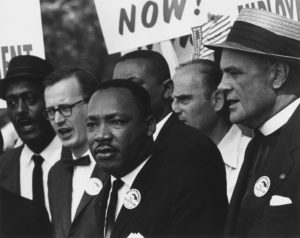
Martin Luther King in Washington, 1963. Photo by Rowland Scherman, U.S. National Archives and Records Administration, Public Domain.
In his essay “‘Contestatory Cosmopolitan Citizenship: The Legacy of Martin Luther King,” Kostas Koukouzelis suggests that King’s campaign of nonviolent protest during the civil rights era “marked a whole new era in world politics.”[50] By making Blacks conscious of their power to transform society, he “probably influenced the pace, substance, and progress of social change more than any other individual of his day.”[51]
His conscience led him to challenge injustice where he saw it, and he did this by convincing the Black community that they could be successful in their nonviolent struggle for justice, equality, and peace.[52] Noted King scholar Lewis V. Baldwin says that celebrating Martin Luther King Jr. Day “means that King’s celebrated dream must become for persons everywhere ‘a sustaining vision’ of what can be and what persons and communities can achieve when they exhibit commitment, determination, and a willingness to work together cooperatively.”[53]
Rather than it simply being a yearly reminder, however, using King’s vision as a daily, driving force could help define our Baptist identities while inspiring new generations of Baptist leaders. Continuing to work toward King’s vision is one way current and future Baptist groups might collectively move into the future while honoring their tradition of maintaining what Leonard calls “a robust biblicism informed by an equally robust concern for ‘soul liberty,’ the freedom of individual and communal interpretation.”[54]
In Martin Luther King Jr.’s Bible and conscience-based, nonviolent approach to dissent as a way of cultivating beloved community, Baptists have a positive, unifying model for undertaking justice work in the 21st century.
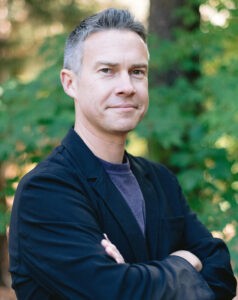
Christian McIvor
Christian McIvor serves as minister of worship, music and the arts at Greystone Baptist Church in Raleigh, N.C.
Notes:
[1] Bill J. Leonard, The Challenge of Being Baptist (Waco, TX: Baylor University Press, 2010), 41.
[2] Bill J. Leonard, Baptists in America (New York: Columbia University Press, 2005), 81-82.
[3] Leonard, The Challenge of Being Baptist, 42.
[4] Ibid., 75, 121.
[5] Leonard, Baptists in America, 2.
[6] Leonard, The Challenge of Being Baptist, 105.
[7] James Melvin Washington, Frustrated Fellowship: The Black Baptist Quest for Social Power (Macon, GA: Mercer University Press, 1986), 204.
[8] Martin Luther King, Jr., Stride Toward Freedom (Boston: Beacon Press, 1958, 1986), 78-79.
[9] Paul R. Dekar, For the Healing of the Nations: Baptist Peacemakers (Macon, GA: Smyth & Helwys Publishing, 1993), 233
[10] Dekar, For the Healing of the Nations, 231.
[11] King, Stride Toward Freedom, 78, 4.
[12] Ibid., 7
[13] Leonard, Baptists in America, 197.
[14] King, Stride Toward Freedom, 7-8.
[15] King, Stride Toward Freedom, 18
[16] Andrew M. Manis, Southern Civil Religions in Conflict: Civil Rights and the Culture Wars (Macon, GA: Mercer University Press, 2002), 99-100.
[17] Ibid., 99-100.
[18] King, Stride Toward Freedom, 78
[19] Jack Turner, “Performing Conscience: Thoreau Political Action, and the Plea for John Brown,” Political Theory Vol. 33 No. 4 (August 2005): 449.
[20] King, Stride Toward Freedom, 84-85
[21] Ibid., 72
[22] Ibid., 42.
[23] King, Stride Toward Freedom, 50-51.
[24] Ibid., 51.
[25] Ibid., 125.
[26] Dekar, For the Healing of the Nations, 229.
[27] King, Stride Toward Freedom, 141.
[28] King, Stride Toward Freedom, 126.
[29] Ibid., 91.
[30] Ibid., Stride Toward Freedom, 207.
[31] Leonard, The Challenge of Being Baptist, 55.
[32] Manis, Southern Civil Religions in Conflict, 110.
[33] Ibid., 83.
[34] King, Stride Toward Freedom, 93
[35] Ibid., 94
[36] Ibid., 95
[37] Ibid., 71
[38] Kostas Koukouzelis, “‘Contestatory Cosmopolitan Citizenship: The Legacy of Martin Luther King,” in Cosmopolitanism and the Legacies of Dissent, ed. Tamara Caraus and Camil Alexandru Pârvu (New York and London: Routledge, 2015), 136.
[39] John A. Kirk, Martin Luther King Jr: Profiles in Power (London and New York: Routledge, 2005), 185.
[40] Dekar, For the Healing of the Nations, 227-228.
[41] King, Stride Toward Freedom, 90-91.
[42] Ibid., 51-52.
[43] Leonard, The Challenge of Being Baptist, 120.
[44] Ibid., 55.
[45] Linda McKinnish Bridges, “A Conversation on an Inclusive Approach to Religious Liberty.” (Baptist Joint Committee presentation Calvary Baptist Church, Washington, DC, April 26, 2019).
[46] Leonard, The Challenge of Being Baptist, 17
[47] Leonard, Baptists in America, 220
[48] Cooperative Baptist Fellowship, “Illumination Project,” Cooperative Baptist Fellowship, http://illuminationproject.net/ (accessed April 24, 2019).
[49] King, Stride Toward Freedom, 205, 202
[50] Koukouzelis, “‘Contestatory Cosmopolitan Citizenship,” 135
[51] Taylor Branch, Parting the Waters: America in the King years 1954-1963 (New York: Simon and Schuster, 1988), quoted in Dekar, For the Healing of the Nations, 237.
[52] Dekar, For the Healing of the Nations, 228
[53] Burrow, Martin Luther King, Jr., and the Theology of Resistance (Jefferon, NC: McFarland & Company, Inc., 2015), 111.
[54] Leonard, The Challenge of Being Baptist, 37

